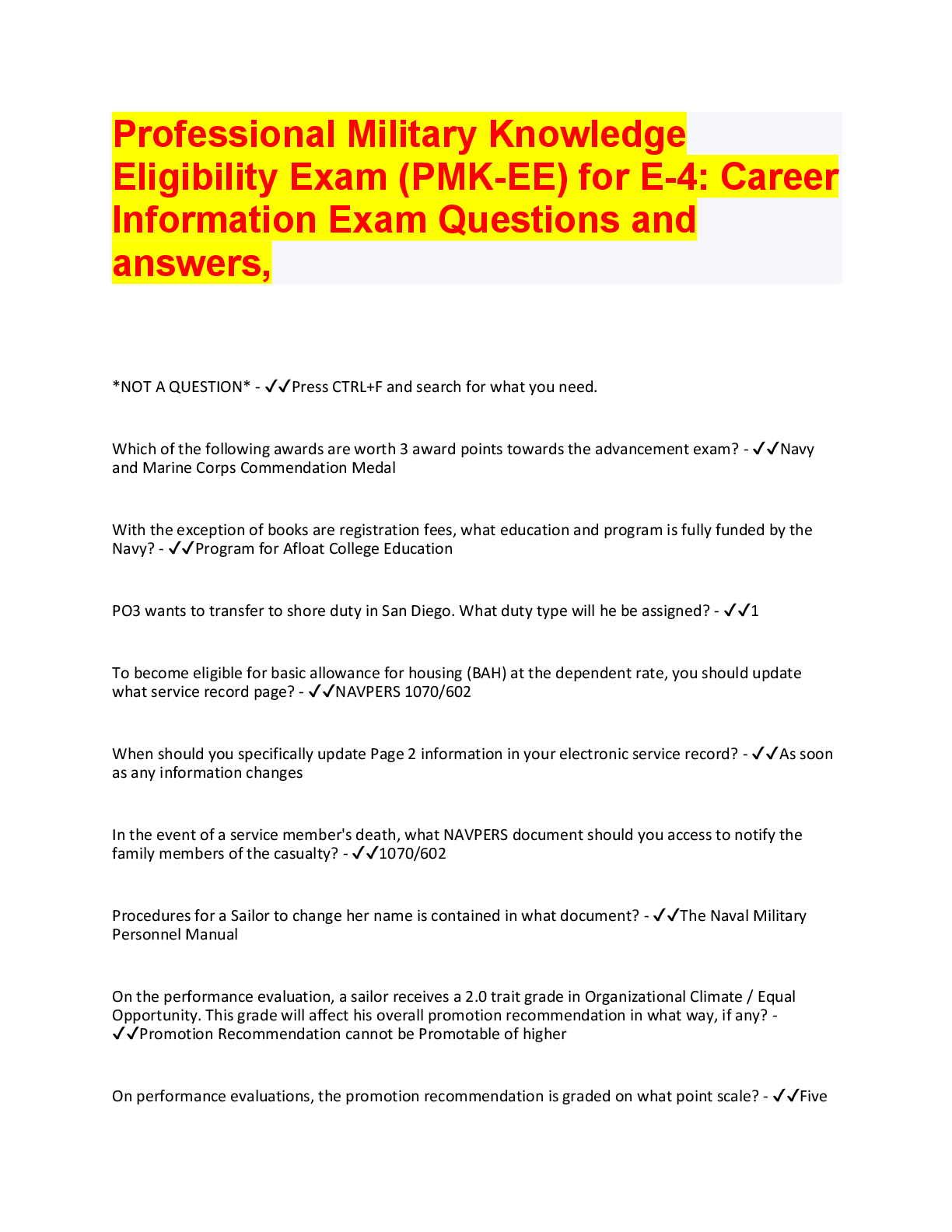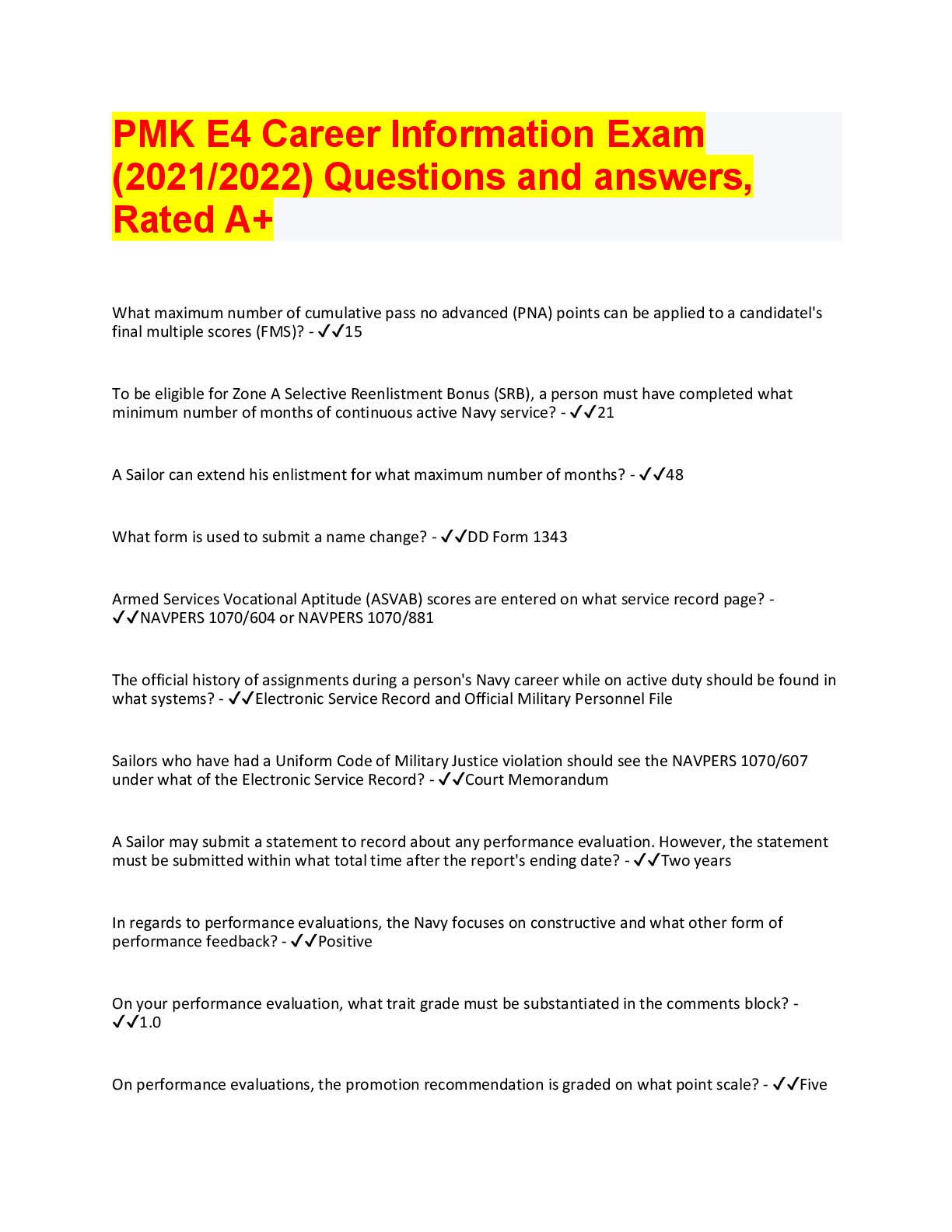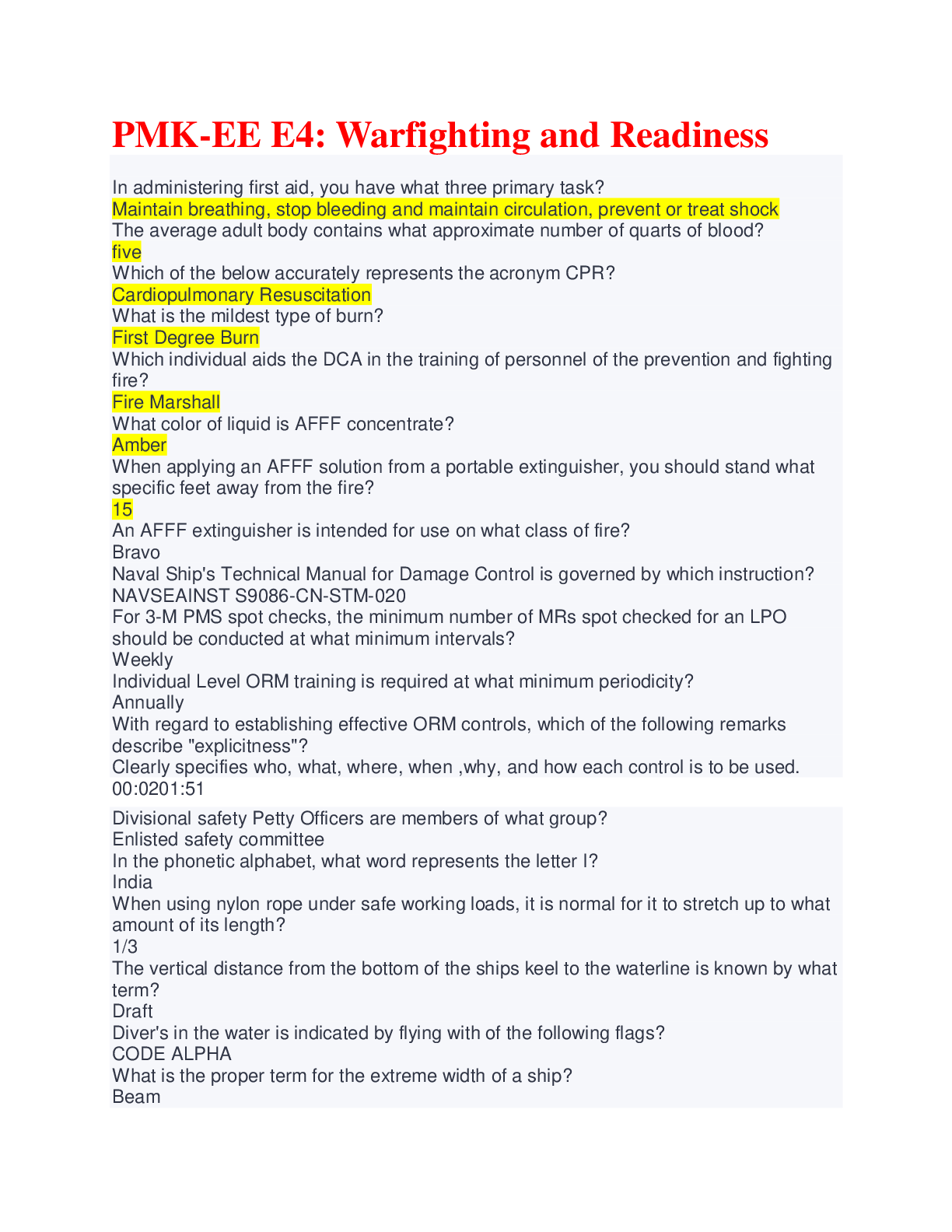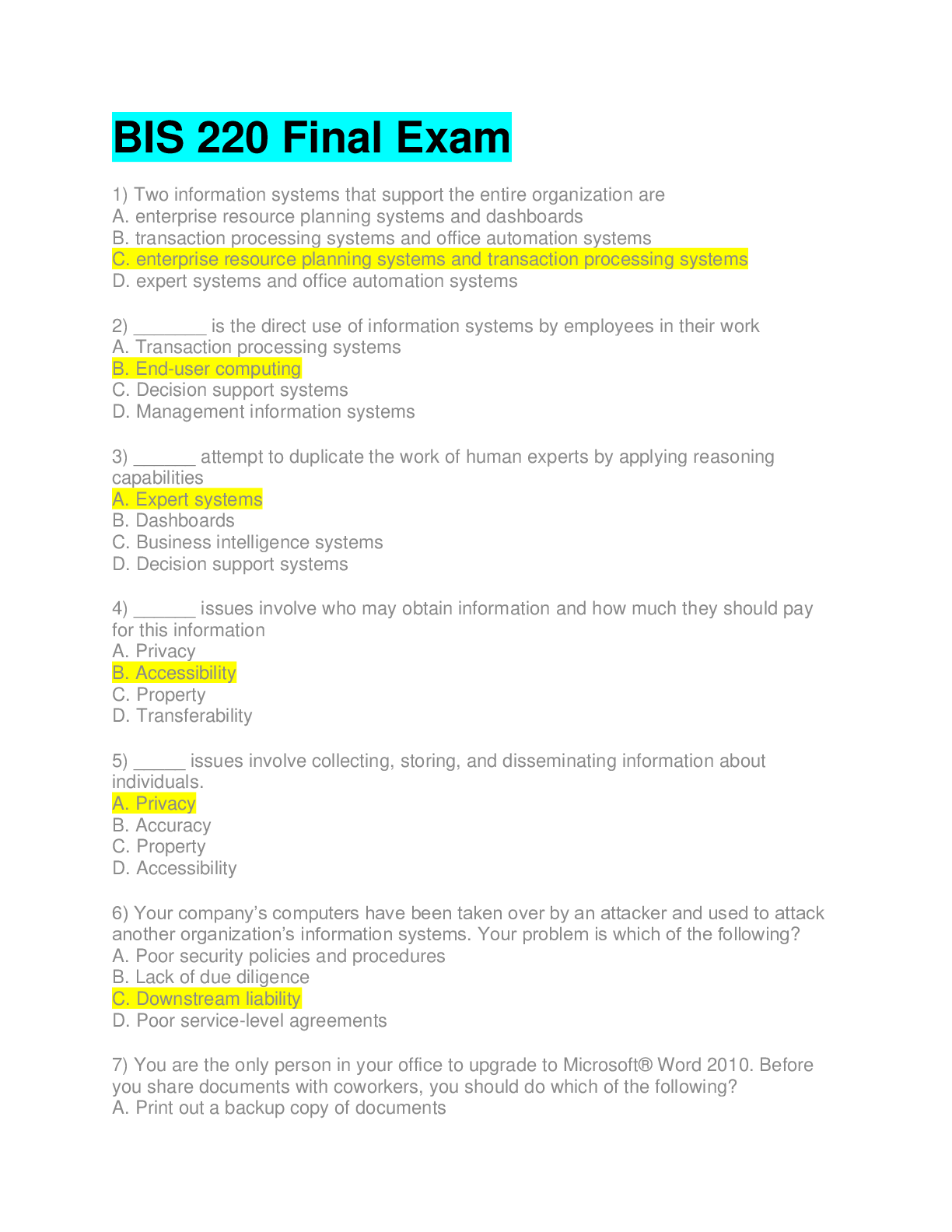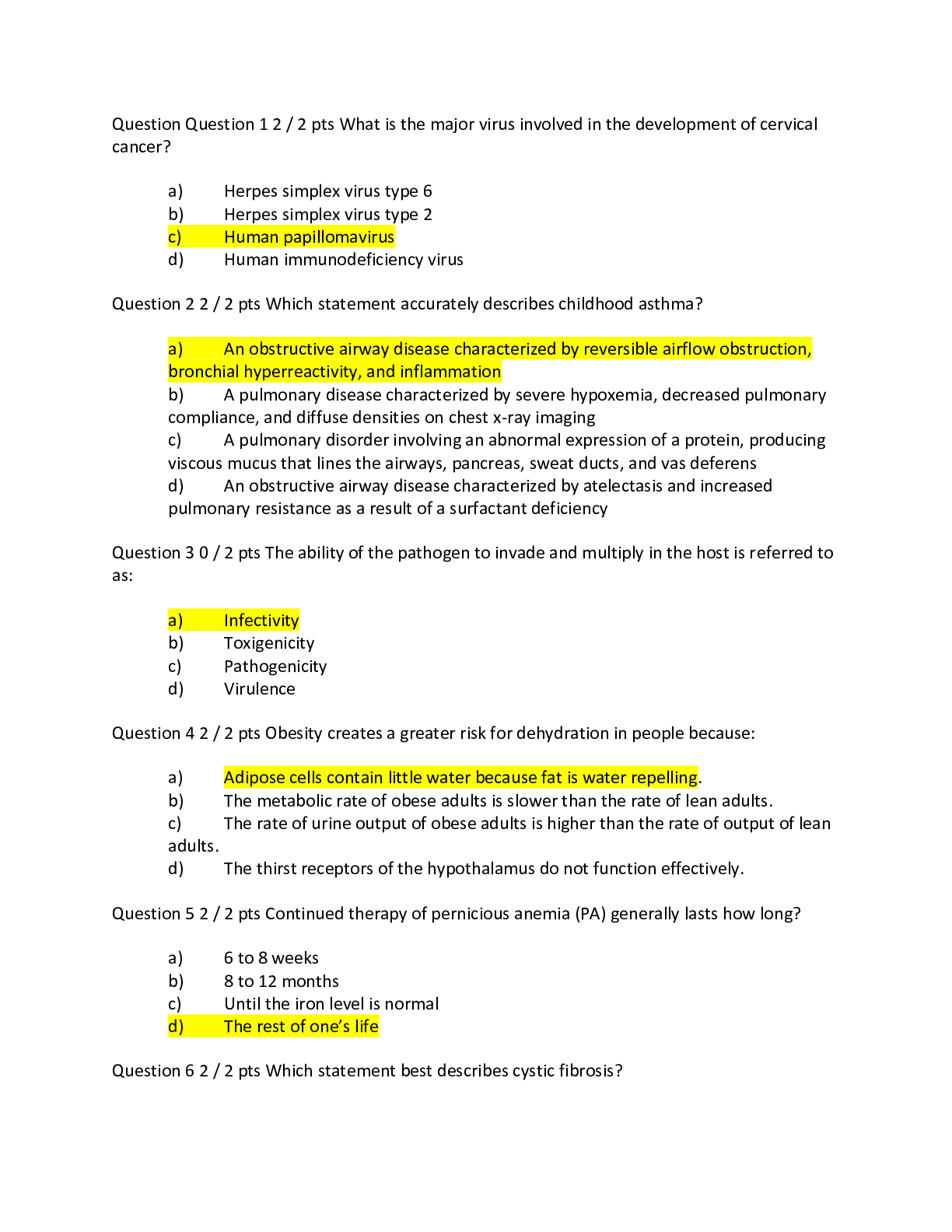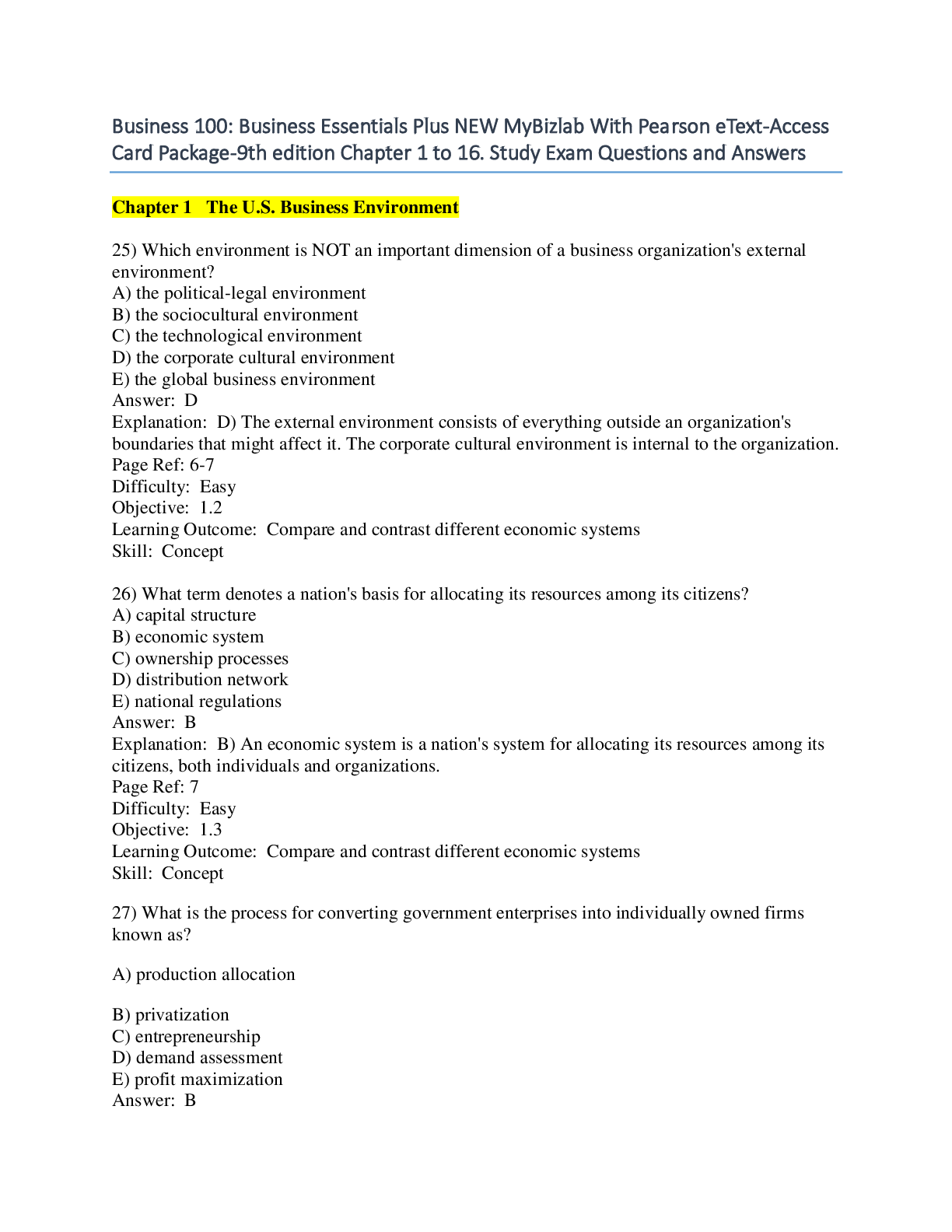*NURSING > QUESTIONS & ANSWERS > RBT Final Exam Questions and answers. 99% proven pass rate. Rated A+ (All)
RBT Final Exam Questions and answers. 99% proven pass rate. Rated A+
Document Content and Description Below
ABA Therapist - ✔✔Refers to the behavior tech that works under the BCBA and implements behavior plans. ABC's of Behavior (AKA: 3 term contingency) - ✔✔Antecedent, Behavior, Consequence A... cquisition Task - ✔✔A target that's in the process of being taught. This behavior is not yet a known skill. Adaptive Skills - ✔✔Self-help skills the child uses for daily living. Antecedent - ✔✔What happens directly before the behavior or trigger. Applied Behavior Analysis (ABA) - ✔✔Design, implementation, and evaluation of an environment to produce improvements in behavior. Applied Behavioral Intervention (ABI) - ✔✔Evidence-based practice that is derived from ABA and are used to address both interfering and on-task behaviors. Assessment of Basic Language & Learning Skills (ABLLS) - ✔✔An assessment tool created by Sundberg & Partington that allows you to assess across 25 varied domains (gross motor skills, receptive skills, etc) to get a complete picture of a child's functioning level, strengths, and deficits. Autism Spectrum Disorder (ASD) - ✔✔AKA: Pervasive Developmental Disorders (PDD). A group of neurobiological disorders that affect a child's ability to interact, communicate, relate, play, imagine, and learn. These disorders not only affect brain development/function, but may also be related to immunological, gastrointestinal, and metabolic problems. BACB - ✔✔The Behavior Analyst Certification Board. Nonprofit established in 1998 to meet professional credentialing. Behavior - ✔✔Observable & measurable responses to cues in the environment. The future frequency of these responses are influenced by the consequences that follow them. Behavior Intervention Plan (BIP) - ✔✔A plan to manage a child's problematic behavior. Includes fostering positive behavior, environmental changes, reinforcements, and other necessary supports. Childhood Autism Rating Scale, 2nd Edition (CARS-2) - ✔✔Behavior rating scale that helps to identify children with autism and determine symptom severity through quantifiable ratings based on direct observation. For ages 2+ Chaining - ✔✔Used to teach multi-step skills in which the steps involved are defined and numbered. The steps are defined through task analysis. (EX: Washing hands- 1st turn on water, 2nd pump soap into hands, 3rd rub hands together, etc) Total Task Analysis - ✔✔The breaking down of a complex skill into smaller, teachable units. Forward Chaining - ✔✔Teaching each step in order and only progressing when the individual step is mastered (step 1, step 1 and 2, step 1 and 2 and 3, etc.) Backward Chaining - ✔✔When teaching a chain behavior, the last step is taught first and the learner learns the steps in reverse. (Ex: drawing a smiley face) Co-morbidity - ✔✔Having multiple diagnoses at the same time. (EX: child having Autism, OCD, and ADHD) Compulsions - ✔✔Deliberate repetitive behaviors that follow specific rules, such as pertaining to cleaning, checking, or counting. Consequence - ✔✔What happens directly after a behavior. Can be good or bad. Deprivation - ✔✔An ABA principle which states that the more deprived of a particular reinforcer, the more powerful that reinforcer will be. Discrete Trial Training (DTT) - ✔✔A method of instruction in which a task is isolated and taught to an individual by repeatedly presenting the same task to the person. Discriminative Stimulus (SD) - ✔✔a stimulus, associated with reinforcement, that exerts control over a particular form of behavior. (EX: washing your hands in hot water- The hot water tap (faucet) is the SD in this situation because selecting the hot tap will lead to the delivery of reinforcement (hot water). Early Intensive Behavioral Intervention (EIBI) - ✔✔Intervention approach that uses ABA principles and is delivered frequently (20-40 hrs weekly) to young children (under age 5) with Autism Spectrum Disorder. Echolalia - ✔✔Repetition of words, phrases, intonation, or sounds of the speech of others. Expressive Language - ✔✔The use of verbal behavior/speech to communicate thoughts, ideas, and feelings with others. Extinction - ✔✔Withholding of reinforcement for a previously reinforced behavior, resulting in reduction of that behavior. Extinction Burst - ✔✔An immediate increase in the frequency of a response when reinforcement is withheld (extinction). Fine Motor Skills - ✔✔Is the coordination of small muscles, in movements-usually involving the synchronization of hands and fingers-with the eyes. Gross Motor Skills - ✔✔Movement and coordination of the arms, legs, and other large body parts and movements. Functional Analysis of Behavior AKA: Functional Behavior Analysis (FBA) - ✔✔The analysis of a child's inappropriate behavior and discovery of its cause. Includes documenting the ABC's. Gestures - ✔✔Nonverbal behaviors used to convey/exchange info. Hyper-Responsiveness - ✔✔Abnormal sensitivity or OVER reactivity to sensory input. Hypo-Responsiveness - ✔✔Abnormal insensitivity or UNDER reactivity to sensory input, in which the brain fails to register incoming stimuli appropriately so that the child doesn't respond to the sensory stimulation. Idiosyncratic Language - ✔✔Language with private meanings or only understandable to those familiar with its origins. Individual Education Plan (IEP) - ✔✔Individualized curriculum plan that school age kids have if they are in special education. Individualized Family Service Plan (IFSP) - ✔✔Plan for kids (birth - 3 years) that ensures appropriate early-intervention services for infants, toddlers, and their families Individual Plan of Service (IPOS) OR Individual Service Plans (ISP) - ✔✔Provides enhanced/detailed info. for individuals that is HIPPA compliant. Includes program definition, data collection, and report generation for goal tracking. Intervention - ✔✔The plan of action/strategy used to change behavior. Intraverbal - ✔✔Verbal response to other's verbal behavior. (EX: saying "car" because someone asked "what do you ride in?") Mand - ✔✔Is a request. (Ex: Asking for a car because you want a car). Tact - ✔✔Is labeling things. (EX: Saying "Balloon" because you see a balloon). Listener Responding (Receptive Language) - ✔✔Responding nonverbally to other's instructions. (EX: Getting the red lego when told, "get the red lego."). Motor Imitation - ✔✔Imitation of motor behavior (EX: pushing a car after watching someone else push a car) Listener responding by Function, Feature, and Class (LRFFC) - ✔✔Receptive identification of items by their feature, function, or class. (EX: Selecting a pic of a car when asked, "what has wheels?"). Natural Environment Teaching (NET) - ✔✔Learning that occurs in the natural environment such as playtime, during dinner, at the bus stop, etc. Occupational Therapist - ✔✔Professional who evaluates fine motor skills and self-care skills. Can also work on sensory issues and feeding difficulties. Perseveration - ✔✔Repetition of a particular response, such as a word, phrase, or gesture, despite the absence or cessation of a stimulus, usually caused by brain injury or other organic disorder. Physical Therapist - ✔✔Professional who evaluates gross motor skills, strength, balance, coordination, and mobility. Picture Exchange Communication System (PECS) - ✔✔A communication system (set of cards) for nonverbal individuals that helps with requests and overall communication. Pointing - ✔✔Typically developed by 12 months. Lack of this skill is one sign of autism. Pragmatics - ✔✔Social rules for using functional spoken language in a meaningful context or conversation. Prompt - ✔✔Form of assistance or cue given to help complete a task. Full Physical Prompt - ✔✔Direct physical contact used to assist client in target behavior. (EX: Told to, "wave." The teacher physically waves the learners hand). Gestural Prompt - ✔✔May include pointing, looking at, or touching item in order to assist client with target behavior. Partial Physical Prompt - ✔✔Provides some assistance to guide the learner through part of the requested activity. (EX: Told to, "clap hands." The teacher gently touches each of the learner's two hands and gently nudges the learner's hands toward each other). Positional Prompt - ✔✔Positions correct response in a way that the student is more likely to choose (i.e. closer to responder) Verbal Prompt - ✔✔Using "vocalizations" to indicate the desired response. Can be an utterance such as sound or part of a word, many words, or even as long as a paragraph Visual Prompt - ✔✔Stimuli which are visible to learners and can be in written form or illustrations which increase the likelihood of the target behavior. Prompt Dependent - ✔✔When an individual has become reliant on being assisted with a task and stops attempting to do the task independently. Prosody - ✔✔The rhythm and melody of spoken language expressed through rate, pitch, stress, inflection, or intonation. [Show More]
Last updated: 2 years ago
Preview 1 out of 16 pages

Buy this document to get the full access instantly
Instant Download Access after purchase
Buy NowInstant download
We Accept:

Also available in bundle (1)

The RBT BUNDLE
COMPRISE OF ALL QUESTIONS AND ANSWERS. ALL YOU NEED TO PASS. DOWNLOAD TO SCORE
By bundleHub Solution guider 2 years ago
$50
24
Reviews( 0 )
$10.00
Can't find what you want? Try our AI powered Search
Document information
Connected school, study & course
About the document
Uploaded On
Aug 14, 2022
Number of pages
16
Written in
Seller

Reviews Received
Additional information
This document has been written for:
Uploaded
Aug 14, 2022
Downloads
0
Views
167


